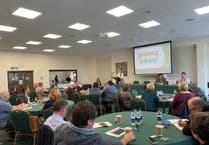Mid and West Wales Fire Service won’t attend automatic fire alarm call-outs from commercial and public sector buildings from July onwards unless an actual fire has been reported.
Fire chiefs said the change will free up resources and they had taken steps to communicate it to organisations which would be affected.
Some premises have fire alarms which don’t trigger a response from the fire service. But many premises have automatic fire alarms which do trigger a fire service response via a receiving centre.
The fire service said statistics showed that the majority of signals from these systems were false alarms triggered by things such as cooking fumes, dust, or inadequate maintenance.
Area manager and head of corporate risk, Peter Greenslade, said: “As a service we attend in excess of 2,000 alarm actuations in commercial buildings every year with over 99 per cent of these calls being false alarms.
“This disrupts the community safety work that the service can deliver, operational training for crews, and introduces environmental and road risks that are unnecessary. Additionally the businesses themselves are impacted due to the disruption caused.”
Fire crews generally don’t travel to automatic fire alarms on blue lights and dealing with these call-outs can take up to an hour.
Mr Greenslade said most automatic fire alarms emanated from hospital, local authority, and education buildings.
The fire service stressed it would continue to attend automatic fire alarms from residential properties, nursing and care homes, premises subject to fire safety prohibition or enforcement notices, and also boarding schools.
A spokeswoman said a consultation about its proposed change had taken place via a wider community risk management plan and it had written to the 100 premises which triggered the most automatic fire alarms. Meetings were offered to health boards, councils, and universities and the change has also been approved by Mid and West Fire Authority, which scrutinises the service.
Mr Greenslade said: “The majority of companies don’t activate alarms into a receiving centre – for those that do they need to factor this (change) into their fire risk assessment.
“It is important that commercial premises take ownership of false fire alarms within their premises as is their legislative duty. We will of course always respond to 999 calls when people have identified that there is a fire.”




